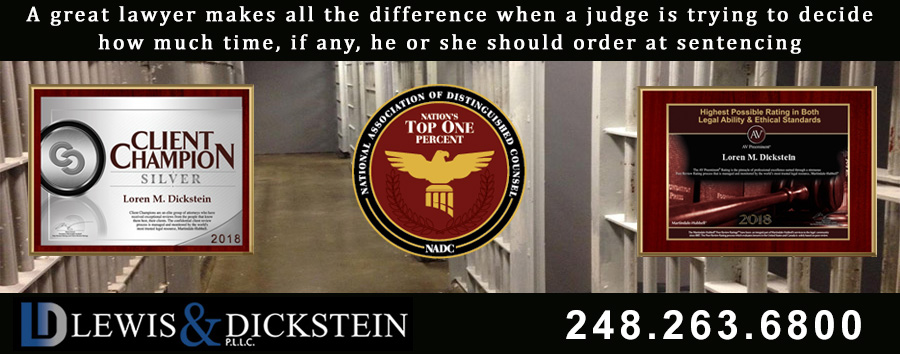Are you concerned about how much time in jail you might have to serve?
If you are accused of a felony or misdemeanor, you may wonder, “How much time will I get in jail?” The most important thing to know is that you may not have to do any time in jail or prison.

Jail Time for Misdemeanor and Felony Offenses
Convictions for felony and misdemeanor offenses can result in jail or prison time; however, many defendants do not have to serve any time. The most time a judge can give for a misdemeanor is up to one year in jail. A felony is punishable by imprisonment for more than one year. Judges have broad discretion and will consider a sentence without incarceration in response to a persuasive argument by an experienced defense attorney. In the most serious offenses, where a defendant is looking at many years in prison, a great lawyer can often get the judge to reduce the sentence by several years with a convincing, credible, and thorough argument at sentencing.
With the Right Legal Representation, You Might Not Have to Do Any Jail Time
Having competent legal representation can be crucial to avoiding a jail sentence for felony or misdemeanor charges for several essential reasons. First, a skilled and experienced attorney can exhaustively investigate the alleged charges and allegations, ensuring that no evidence or potential defenses are missed. A respected criminal defense lawyer will be familiar with the nuances of the law and will be able to identify any procedural errors or constitutional violations that could work to your advantage. A highly competent attorney can also negotiate with prosecutors to secure a plea bargain or a reduced charge, which may result in probation or alternatives to incarceration. A persuasive attorney can also confidently present your case in court, using compelling arguments and evidence to sway the judge or jury in your favor. In the end, skilled and experienced legal representation can make a significant difference in the outcome of your case, potentially allowing you to avoid jail time and find a more favorable resolution.

Possible Sentences on Common Offenses
Offenses Carrying a Possible 90 or 93 Days in Jail and Up to 2 Years of Probation
- Domestic Violence
- Assault and Battery
- Retail Fraud 3rd Degree
- Operating While Intoxicated
- Operating While Impaired
- Operating With the Presence of Drugs
- Driving While License Suspended
- Reckless Driving
- Malicious Destruction of Property under $200
Offenses Carrying a Possible One Year in Jail and Up to 2 Years of Probation
- OWI 2nd (minimum five (5) days jail)Aggravated Domestic Violence
- Retail Fraud 2nd Degree
- Aggravated Assault
- Aggravated Domestic Violence
- Domestic Violence – Second Offense
- DWLS 2nd
- Malicious Destruction of Property under $1,000
Offenses Carry Possible Prison Time and Up to 5 years of Probation
- OWI 3rd
- Felonious Assault
- Felony Firearm
- Delivery of a Controlled Substance
- Possession of a Controlled Substance or Prescription Medication
- Home Invasion
- Breaking and Entering
- Uttering and Publishing
- Unarmed Robbery
- Using a Computer to Commit a Crime
- Assault with Intent to Do Great Bodily Harm
- Felony Domestic Violence Third Offense
- Domestic Strangulation
- Assault with Intent to Do Great Bodily Harm
- Larceny from a Person
- Embezzlement Over $1,000
- Criminal Sexual Conduct
- Manslaughter
- Internet and Computer Crimes
- Conspiracy or RICO
- Malicious Destruction of Property over $1,000.00
- Child Pornography
- Healthcare Fraud
- False Pretenses and More

What does a judge consider when deciding a sentence?
The first rule of thumb is that every judge is different. Some judges focus more on punishment, and others consider rehabilitation. An experienced and successful lawyer knows the judge and will customize any allocation on behalf of a client to suit the particular judge deciding the sentence. In other words, the answers to “How much time will I get?” or “Will I have to go to jail” are complicated.
A judge in Michigan is supposed to consider the following:
- Need for punishment
- Deterrence of the defendant from committing similar offenses in the future
- Deterrence of people in the community who may commit a similar offense
- Rehabilitation
- Likelihood of committing another crime
- Various other mitigating factors
- The Michigan Sentencing Guidelines

How to convince a judge not to give jail time?
There is no magic answer for convincing a judge not to order jail or prison time. Most criminal defense lawyers spend their entire careers figuring out how to make the most persuasive argument at sentencing. Various factors influence the judge’s decision at sentencing, including the prosecutor’s position, any recommendation by the detective in charge of a case, the opinion of the victim or complainant, the facts of the case, the history and circumstances of the defendant, and the persuasiveness of the defense lawyer. Skilled and formidable attorneys, like those with LEWIS & DICKSTEIN, P.L.L.C., will spend considerable time, energy, and thought on careful and thorough preparation to achieve the lowest possible sentence.
How Much Time Can I Face for Probation Violation
If you are accused of felony or misdemeanor probation violation, you face the same amount of incarceration you faced on the original charge. Probation violations do not result in a new conviction, just a new sentence on the original charge. Although judges often impose jail or prison on probation violations, a top-notch lawyer can frequently help you avoid jail time.

Criminal Defense Attorneys that are Experts at Sentencing
If you wonder, “How much time will I get at sentencing?” you are appropriately concerned about the potential sentence you may receive. A great lawyer makes all the difference when a judge is trying to decide how much time they should order at sentencing. The Defense Team with LEWIS & DICKSTEIN, P.L.L.C. has decades of experience handling sentencings and helping clients achieve the lowest possible jail or prison time. In most cases, we can help a client avoid serving any time in custody. If you are accused of a felony or misdemeanor offense, please call us today for a free consultation. We will take the time to talk with you, answer your questions, and address your concerns. We will find a way to help you.
Call us today at (248) 263-6800 for a free consultation or complete an online Request for Assistance Form. We will contact you promptly and find a way to help you.













